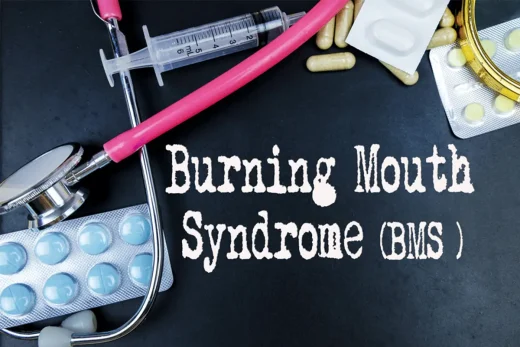Patients describe pain, ache and burning sensation in the mouth, tongue, palate, cheeks and gums. It is called “burning mouth syndrome” (BMS). Complaints are milder in the morning. Gradually worsen during the day, and are usually relieved by food intake. Oral mucosa is usually normal, but some patients may have cracks in the tongue. Some patients express that they feel different tastes in the mouth. Such as bitter or metallic. It may be accompanied by a feeling of nausea. But the most seen symptom is burning sensation in mouth and throat.
Burning mouth is a rare problem. It is estimated to affect 1-3% of the adult population. It is 5-7 times more common in women than men. The disease is rare before the age of 30. Mostly seen in middle-aged and older women. The majority of patients are postmenopausal women between the ages of 50 and 60.
The disease usually has a slow onset and sore mouth syndrome worsen over the years. In about half of the patients, the initial bms symptoms are associated with dental problems and treatments. For this reason, they first apply to a dentist or ENT specialist.
Bms burning mouth syndrome is a neuropathic pain of unknown origin. The fact that the disease is almost always accompanied by decrease in the sense of taste.
It is thought that psychological problems in patients are as a result of the disease rather than the cause. However, it is also known that the rate of having received psychiatric treatment in the past is seen higher.
Before the Diagnosis
Before the diagnosis of burnt mouth syndrome is made. The presence of other pathologies that may cause similar complaints should be investigated.
Diseases that may cause similar symptoms and should be considered in the differential diagnosis;
Intraoral inflammations (inflammations with microbes called fungi or viruses)
Dental problems, fillings and prostheses
Smoking, chewing and frequent alcohol use
Sjögren’s syndrome (A disease with dry mouth and eyes)
Rheumatic diseases such as scleroderma and rheumatoid arthritis
Gastroesophageal reflux disease
Chemotherapy, radiotherapy
Poorly controlled diabetes
Iron, folic acid, vitamin B12 and other B vitamin deficiencies, zinc deficiency
Hypothyroidism (underactive thyroid gland)
Psychological disorders (Depression, anxiety, hypochondriasis, etc.)

Burning Mouth Syndrome Symptoms
Listening to the patient’s complaints in detail and investigating other diseases mentioned above that may cause similar burning mouth syndrome causes constitute the most important step in diagnosis. Particular attention should be paid to other diseases in the elderly with oral complaints.
Findings supporting the existence of hot mouth syndrome are:
Burning and/or pain sensation in the mouth (Can be felt on the tongue, palate, lips or gums)
Metallic and/or bitter taste on the tongue and dry mouth
Alleviation of pain with food intake
Gradual decrease in complaints during the day
Presence of complaints for a long time (at least 4 months)
Burning Mouth Syndrome Treatment
These patients should also be evaluated. By gastroenterologists, dentists and psychiatrists which are the doctors specializing in burning mouth syndrome when necessary. Also the identified causes should be eliminated. Especially if there are vitamin deficiencies. They should be eliminated and plenty of fluids should be taken. There is actually no instant relief from burning mouth syndrome.
Since there is no obvious pathological lesion, burning mouth syndrome treatment options are limited.
It has been reported that successful results can be obtained with long-term psychiatric treatment in cases of mouth syndrome. Burning mouth syndrome medication Combinations of antidepressant and antipsychotic treatment may be beneficial in depressed patients. Factors such as the patient’s reluctance to receive psychiatric treatment, his negative attitude towards psychotropic drugs, and his discontinuation of treatment after discharge may reduce the success of treatment. Determining the psychological factors that may contribute to the emergence of the disease, educating and informing patients and physicians about this disease will make significant contributions to the treatment.
Erdem Hospital – The right choice for your health!